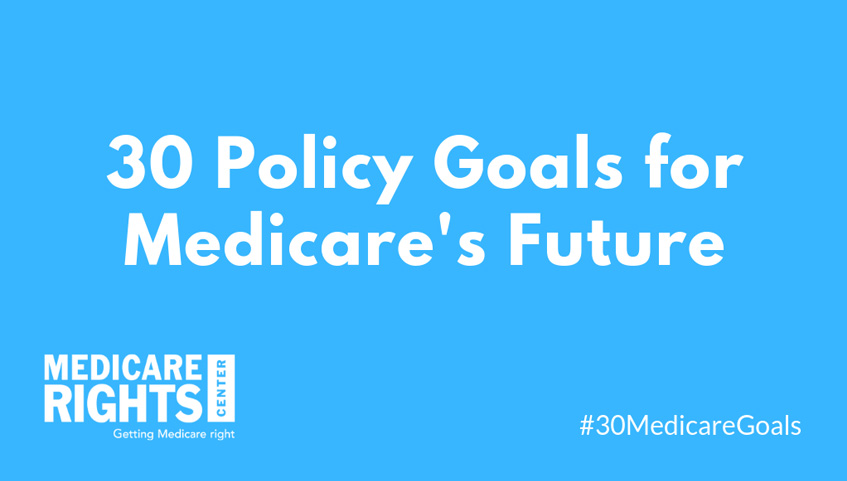Join Us Live for a Discussion on Medicare, Democracy, and the Future of Health Care
Medicare Rights Lists 30 Policy Goals for Medicare’s Future

This June, the Medicare Rights Center celebrates 30 years of getting Medicare right. Our policy goals are informed by 30 years of serving people with Medicare on our national helpline and through our educational programs. This anniversary represents an important opportunity to look forward and explore how policymakers can make the Medicare program even better.
Thinking ahead to the next 30 years, it’s critically important to broadly modernize benefits in both Original Medicare and private Medicare plans. At the same time, it’s essential to pursue changes that improve how 60+ million people with Medicare navigate their coverage on a daily basis. In no particular order, here’s a sampling of our evolving 30 policy goals for Medicare’s future:
- Make Prescription Drugs More Affordable—Medicare Rights supports efforts to meaningfully reduce drug prices and lower costs for both people with Medicare and the program as a whole. Potentially effective strategies include allowing Medicare to negotiate drug prices, increasing pricing transparency and accountability throughout the supply chain, and imposing limits on beneficiary out-of-pocket spending. Changes to the current system must be carefully considered and only adopted if they do not threaten to undermine beneficiary protections or access to medications, such as by weakening the protected classes or introducing additional, inappropriate utilization management strategies.
- Provide Medicare Coverage for More Home Health and Long-term Care Services—Medicare (including Original Medicare and Medicare Advantage) does not cover many long-term services and supports. And it covers help with activities of daily living, like eating and bathing, only in very limited circumstances. Reflecting broad national trends, many callers to the Medicare Rights national helpline seek help paying for this care. Congress must modernize the Medicare program to meet this growing need by expanding coverage for services that allow beneficiaries to remain in their homes and for family caregiver supports, like respite care and adult day health care, and by filling existing coverage gaps, such as eliminating the requirement that Medicare beneficiaries need skilled care and be homebound to qualify for home health coverage, as well as the “use in the home” limitation on DME.
- Pass the BENES Act—Complex Medicare enrollment rules and lack of notification cause tens of thousands of older adults and people with disabilities to face lifetime penalties, coverage gaps, and other harmful consequences. The Beneficiary Enrollment Notification and Eligibility Simplification (BENES) Act (S. 1280/H.R. 2477) would help people avoid making these costly errors by modernizing the Part B enrollment process. It would ensure that people approaching Medicare eligibility receive clear and timely information about Medicare Part B enrollment rules, simplify Part B enrollment periods, and improve transitions to Medicare by eliminating needless gaps in coverage.
Show Comments
We welcome thoughtful, respectful discussion on our website. To maintain a safe and constructive environment, comments that include profanity or violent, threatening language will be hidden. We may ban commentors who repeatedly cross these guidelines.
Help Us Protect & Strengthen Medicare
Donate today and make a lasting impact
More than 67 million people rely on Medicare—but many still face barriers to the care they need. With your support, we provide free, unbiased help to people navigating Medicare and work across the country with federal and state advocates to protect Medicare’s future and address the needs of those it serves.
The Latest
Most Read
Add Medicare to Your Inbox
Sign up to receive Medicare news, policy developments, and other useful updates from the Medicare Rights.
View this profile on InstagramMedicare Rights Center (@medicarerights) • Instagram photos and videos









